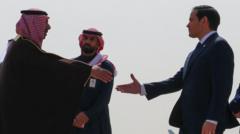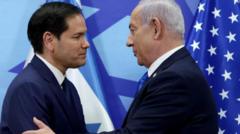In the wake of President Trump’s request for Egypt and Jordan to accept two million Palestinians from Gaza, both nations are engaging in diplomatic tactics to deter the U.S. leader from his proposal. With the threat of mass resettlement looming, these countries prefer to redirect focus on humanitarian efforts and regional stability while managing relations with the U.S.
Trump's Palestinian Proposal: Egypt and Jordan's Diplomatic Maneuvers

Trump's Palestinian Proposal: Egypt and Jordan's Diplomatic Maneuvers
As the U.S. administration suggests resettling Gazans, Jordan and Egypt seek alternative strategies.
Finding themselves under pressure, both Jordan and Egypt have initiated moves to placate President Trump amid concerns over his suggestion to resettle a large number of Palestinians from Gaza into their territories. For these Arab nations, endorsing the U.S.’s idea proves immensely challenging and is perceived as a potential threat to their national stability and security.
To alleviate Trump’s insistence, Jordanian King Abdullah met with the president and proposed to accept 2,000 Palestinian children suffering from severe health issues as a humanitarian gesture. While this offer has been likened to a token concession, it reflects the Kingdom’s reluctance to take in a more substantial number of refugees. Trump welcomed this gesture, though Arab leaders are expressing reservations about the scale of resettlement he is suggesting.
In the dialogue, King Abdullah emphasized the critical necessity for U.S. leadership in achieving a two-state solution viewed as vital for lasting peace and stability in the region. While he acknowledged U.S. involvement, he firmly rejected the mass displacement of Palestinians, conveying Jordan’s position that the solution to the Gaza conflict lies in reconstruction efforts and long-term peace rather than forced resettlement.
By providing humanitarian support instead of embracing Trump’s broader resettlement option, both Egypt and Jordan are maneuvering to protect their interests and buy time. Political analysts suggest that this approach may sway Trump’s view, leading him to reconsider the viability and implications of his proposal. Despite the challenges, the Jordanian leadership remains cautious but hopeful that an alternative diplomatic strategy could ease the tensions surrounding the Palestinian issue amidst a changing geopolitical landscape.
To alleviate Trump’s insistence, Jordanian King Abdullah met with the president and proposed to accept 2,000 Palestinian children suffering from severe health issues as a humanitarian gesture. While this offer has been likened to a token concession, it reflects the Kingdom’s reluctance to take in a more substantial number of refugees. Trump welcomed this gesture, though Arab leaders are expressing reservations about the scale of resettlement he is suggesting.
In the dialogue, King Abdullah emphasized the critical necessity for U.S. leadership in achieving a two-state solution viewed as vital for lasting peace and stability in the region. While he acknowledged U.S. involvement, he firmly rejected the mass displacement of Palestinians, conveying Jordan’s position that the solution to the Gaza conflict lies in reconstruction efforts and long-term peace rather than forced resettlement.
By providing humanitarian support instead of embracing Trump’s broader resettlement option, both Egypt and Jordan are maneuvering to protect their interests and buy time. Political analysts suggest that this approach may sway Trump’s view, leading him to reconsider the viability and implications of his proposal. Despite the challenges, the Jordanian leadership remains cautious but hopeful that an alternative diplomatic strategy could ease the tensions surrounding the Palestinian issue amidst a changing geopolitical landscape.





















